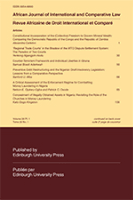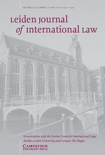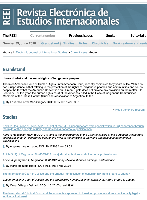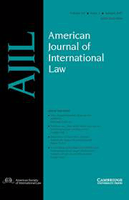
International Organizations Law Review
Scope & Guideline
Bridging Disciplines for a Comprehensive Understanding of Global Governance
Introduction
Aims and Scopes
- Study of Regional International Organizations:
The journal extensively explores the legal structures, functions, and implications of regional international organizations, highlighting their distinctiveness and contributions to international law. - International Law and Governance:
It examines the relationship between international law and governance mechanisms of international organizations, assessing how these entities influence global governance and legal frameworks. - Accountability and Human Rights:
A significant focus is placed on the accountability mechanisms within international organizations, particularly regarding human rights and access to justice. - Impact of Global Issues:
The journal addresses the impact of pressing global issues, such as health crises, security threats, and environmental challenges, on the operation and legal responsibilities of international organizations. - Legal Theory and International Law:
Theoretical discussions on the nature of international organizations and their legal status are also a core area, contributing to the broader understanding of international legal principles.
Trending and Emerging
- Health Governance and International Organizations:
There is a growing focus on the role of international organizations in health governance, particularly in light of recent global health crises, such as the COVID-19 pandemic. This theme explores the legal frameworks that govern health responses and accountability. - Sustainability and Environmental Law:
Emerging discussions on sustainability and environmental law highlight the role of international organizations in addressing climate change and environmental degradation, indicating a shift towards integrating environmental considerations into international law. - Political Legitimacy and Representation:
Research examining the political legitimacy of international organizations and the representation of diverse stakeholders is trending, reflecting a broader concern for democratic governance within these entities. - Technological Impact on Governance:
The impact of technology on the functioning and governance of international organizations is increasingly relevant, with emerging research focusing on digital governance and the implications of virtual interactions. - Interplay between International Law and Domestic Jurisdictions:
There is an emerging interest in the coordination between international organizations and domestic legal orders, particularly regarding access to justice and the harmonization of legal frameworks.
Declining or Waning
- Traditional Theoretical Frameworks:
Discussions surrounding traditional theories of international organization law have decreased, indicating a potential shift towards more contemporary and practical approaches. - Focus on State-Centric Perspectives:
There has been a noticeable reduction in papers emphasizing state-centric views of international organizations, as the focus moves towards more inclusive and diverse approaches that consider non-state actors. - Historical Analyses of International Organizations:
Papers centered on historical perspectives of international organizations are appearing less frequently, suggesting a preference for current and forward-looking analyses. - Narrow Legal Doctrines:
Research concentrating on narrow legal doctrines related to international organizations has diminished, indicating a broader interest in interdisciplinary and holistic approaches. - Regional vs. Global Perspectives:
The emphasis on comparisons between regional and global organizations has waned, as more researchers focus on the specific dynamics and implications of regional organizations alone.
Similar Journals

African Journal of International and Comparative Law
Illuminating Africa's Legal LandscapeAfrican Journal of International and Comparative Law is a distinguished publication that serves as a vital forum for scholarly discourse in the fields of international and comparative law, with a specific focus on legal issues pertinent to the African continent. Published by Edinburgh University Press, this journal boasts a respectable impact factor and finds its reputation bolstered by its strategic ranking within the Q3 category of law, according to Scopus metrics, where it occupies the 681st rank out of 1025 journals. Although it does not currently offer open access, the journal remains committed to fostering legal scholarship and providing critical insights that bridge the gap between theory and practice. The journal's coverage encompasses scholarly articles, case studies, and analyses of contemporary legal challenges from 2005 to 2024, making it an indispensable resource for researchers, practitioners, and students dedicated to advancing their understanding of international and comparative legal frameworks in the African context. The editorial team encourages submissions that contribute to the dialogue on legal reforms, human rights, and the impact of globalization on African law.

Leiden Journal of International Law
Illuminating contemporary challenges in international law.Leiden Journal of International Law, published by Cambridge University Press, stands as a leading platform for scholarly discourse in the fields of international law and political science. With its ISSN 0922-1565 and E-ISSN 1478-9698, the journal has established a significant academic presence since its inception in 1988, upholding rigorous standards through a robust peer-review process. The journal is notable for its impressive impact factor, categorizing it in the Q1 quartile for law and Q2 for political science and international relations, indicating its widespread influence and recognition among scholars. As a vital resource for researchers and practitioners, the journal contributes to the advancement of legal scholarship and promotes critical discussions surrounding contemporary international issues. Although it operates under a traditional subscription model, its comprehensive analyses and critical insights make it an essential read for those engaged in the interdisciplinary examination of law and global governance. The journal is headquartered in Cambridge, England, and continues to play a pivotal role in shaping the discussions that define the contemporary landscape of international law.

COLUMBIA JOURNAL OF TRANSNATIONAL LAW
Advancing Scholarship in Transnational Legal Studies.The COLUMBIA JOURNAL OF TRANSNATIONAL LAW, published by the COLUMBIA JOURNAL TRANSNATIONAL LAW ASSOCIATION, stands as a premier academic platform in the fields of Law, Political Science, and International Relations. Having maintained a commendable Q2 ranking in both law and political science categories for 2023, it represents a vital resource for scholars and practitioners alike in navigating the complexities of transnational legal issues from 1996 to 2024. Situated in the U.S. at the esteemed Columbia University School of Law, the journal not only meets the rigorous academic standards but also addresses pressing global challenges through interdisciplinary research. Although it does not currently offer open access options, its commitment to providing insightful analyses and fostering robust scholarly dialogue in a rapidly changing world remains paramount. With its inclusion in reputable databases like Scopus, the journal is poised to impact the academic landscape significantly, catering to both emerging and established voices in transnational law.

Revista Electronica de Estudios Internacionales
Navigating the Complexities of Global AffairsRevista Electronica de Estudios Internacionales is a prominent academic journal dedicated to the exploration of international studies, published by the esteemed ASOC ESPANOLA PROFESORES DERECHO INT & RELACIONES INT-AEPDIRI. Based in Spain, this journal has embraced an Open Access model since its inception in 2000, allowing researchers, students, and professionals to freely access and disseminate significant findings in the field. With an ISSN of 1697-5197, the journal highlights critical issues surrounding international law and relations, maintaining a vital role in the ongoing discourse within the academic community. Currently categorized as Q4 in the Law field and ranked #755 out of 1025 within the Scopus database, the journal offers a platform for innovative thinking and scholarly contributions, which are particularly important in today's rapidly evolving global scenario. Explore the latest research and insights from 2019 to 2023 in this essential resource for those engaged in the study and practice of international relations.

AMERICAN JOURNAL OF INTERNATIONAL LAW
Elevating Understanding of International GovernanceThe American Journal of International Law, published by Cambridge University Press, stands as a crucial platform for scholarly discourse in the fields of law, political science, and international relations. With a longstanding tradition since its inception in 1937, this prestigious journal has maintained a remarkable reputation, reflected in its Q1 ranking in both Law and Political Science and International Relations as of 2023. It is recognized for its rigorous peer-review process and impactful contributions to the understanding of legal frameworks and international governance. Researchers and practitioners alike will find the journal invaluable, not only for its comprehensive analyses and original research articles but also for its commitment to advancing the field. Although it does not offer open access, its accessibility through academic institutions ensures that a broad audience can engage with its content, making it essential reading for those involved in international legal scholarship.

International Community Law Review
Contributing to Global Legal Scholarship.International Community Law Review, published by MARTINUS NIJHOFF PUBLISHERS, is a distinguished journal that contributes significantly to the fields of law and international relations. With an ISSN of 1871-9740 and an E-ISSN of 1871-9732, this journal serves as a vital platform for scholarly discourse on issues pertaining to international law, promoting a deeper understanding and engagement with complex legal frameworks and global challenges. Currently classified in the Q3 quartile for Law and Political Science and International Relations, the International Community Law Review ranks 475 out of 1025 in the Law category and 386 out of 706 in Political Science, reflecting a moderate impact in the academic community. Though it does not currently offer Open Access, the journal's extensive coverage from 2007 through 2024 ensures that it remains a relevant resource for researchers, professionals, and students. Published in the Netherlands, this journal aims to foster the development of international legal thought, support academic research, and facilitate discussions that shape modern international legal practices.

WASHINGTON LAW REVIEW
Unveiling the Dynamics of Law and SocietyWASHINGTON LAW REVIEW, published by the University of Washington School of Law, is a premier legal journal that plays an essential role in the dissemination of scholarly work in the field of law. With a longstanding commitment to excellence, this journal has been pivotal in shaping legal discourse since its inception. It is ranked in the Q2 quartile in Law, as per 2023 evaluations, and holds a notable position within the top 54th percentile of its category on Scopus. The journal’s extensive publication history, covering years from 1973 to 2024, provides a rich repository of legal scholarship, making it a valuable resource for researchers, practitioners, and students alike. While the journal does not currently offer open access, its authoritative articles cover a diverse array of topics within legal studies, ensuring that the most relevant and impactful discussions are accessible to the academic community and beyond. For those looking to stay informed about cutting-edge legal issues and advancements, WASHINGTON LAW REVIEW remains an indispensable asset in the pursuit of knowledge and advocacy in the realm of law.

University of Pennsylvania Journal of International Law
Bridging Borders Through Legal InsightThe University of Pennsylvania Journal of International Law is a pivotal academic publication that serves as a forum for groundbreaking legal scholarship, particularly in the complex and dynamic field of international law. Published by the University of Pennsylvania Law School, this journal supports a diverse array of interdisciplinary research and discourse, capturing insights that bridge legal, economic, and political landscapes. As of 2023, it is positioned in Quartile 3 in Law and Quartile 4 in Economics according to Scopus rankings, underscoring its relevance and contributions to legal academia. The journal is accessible through conventional methods, with its physical presence anchored in Philadelphia, Pennsylvania. With a commitment to fostering dialogue on both emerging and traditional legal issues, the journal aims to engage scholars, practitioners, and students alike, encouraging contributions that enrich understanding and drive progressive legal thought. This commitment to academic excellence ensures that the University of Pennsylvania Journal of International Law remains a vital resource for those seeking to navigate the challenges of international legal frameworks.

AJIL Unbound
Innovating Access to Legal Research and InsightsAJIL Unbound is an esteemed open-access journal published by Cambidge University Press that has been serving the legal academic community since 2013. With its focus on international law and related social science disciplines, this journal offers a platform for innovative research and critical discourse in the field. Thanks to its robust engagement features and commitment to accessibility, AJIL Unbound facilitates the dissemination of knowledge while fostering scholarly communication among researchers, practitioners, and students. With a notable ranking of #192 out of 1025 in the realm of Social Sciences Law, it stands in the 81st percentile, showcasing its influence and reach within the legal field. Its open-access model enhances visibility and encourages wider participation in discussions surrounding pressing legal issues. As the journal continues to converge its objectives from 2013 to 2024, it remains a vital resource for academics looking to explore contemporary legal challenges and advancements.

Cambridge International Law Journal
Advancing global dialogue in international law.The Cambridge International Law Journal, published by Edward Elgar Publishing Ltd, is a pivotal resource for scholars and practitioners engaged in the dynamic field of international law. With an ISSN of 2398-9173 and an E-ISSN of 2398-9181, this journal provides a platform for interdisciplinary research, addressing contemporary legal issues and developments from a global perspective. Since its inception in 2012, it has garnered recognition, reflected in its 2023 Scopus rank of #549 out of 1025 in the category of Social Sciences (Law), positioning it in the 46th percentile. The journal embraces an open-access model, ensuring that its cutting-edge scholarship reaches a wide audience. The objective of the Cambridge International Law Journal is to foster dialogue among legal scholars, practitioners, and students, making significant contributions to the discourse around international legal frameworks. For those seeking comprehensive insights and analyses in law, this journal stands out as an essential resource.